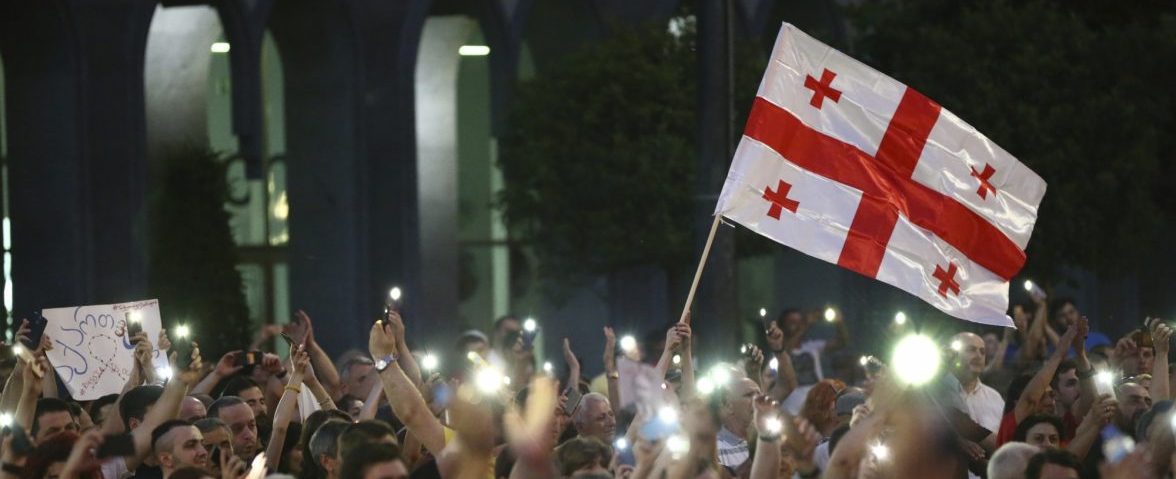Russian-Georgian relations are chronically and predictably bad. There is no reason for an improvement in the relationship, but there’s ample justification for spontaneous crises like the current one.
A public uprising that took place in Georgia in June 2019 and threatened to develop into a real coup was the result of the negligence and irresponsibility of local organizers who set up an Inter-parliamentary Assembly on Orthodoxy. By a strange coincidence, they neglected to take into account that the group’s current chair is Sergei Gavrilov, a Communist Party Russian State Duma deputy. In allowing such a person to enter the country and to take the place of the parliament’s speaker, the organisers of the event had made a colossal and apparently unintentional political blunder, which led to a massive protest.
While the incident was simply a case of protocol failure, it has already caused a profound political crisis that has led to the resignation of the Chairperson of the Parliament of Georgia, who is one of the actual leaders of the Georgian Dream-Democratic Georgia party. How that could this have happened?
The reasons for the current crisis are primarily symbolic. They are related to the impossibility of solving Georgia’s territorial dispute with Abkhazia, South Ossetia and Russia. It is symbolic, because for local elites, the issue of Georgian integrity has become an obsession rather than just a political question. This long-standing conflict, which has lasted for two decades, is so profound and irreconcilable that the parties have abandoned looking for a compromise. Everyone is betting on undermining the internal forces of their opponent and on forcing them to relinquish their claims.
Although no one wanted to revive this long-standing conflict, there has always been a reason for a spontaneous flare-up. Among both wealthy Georgians and ordinary citizens, anti-Russian sentiments are widespread. Russia is unanimously accused of occupation of Abkhazia and South Ossetia. This essential claim is taught in schools and universities, and has the support of the citizens of the country.
Massive discontent was inevitable; the presence of a Russian State Duma deputy in Georgia was only a pretext for the current explosion. Its main reason is the accumulated fatigue citizens feel towards the sluggish and unwise policies of the ruling Georgian Dream party. A number of deplorable incidents including corruption scandals, the ousting of the opposition from public office at all levels, and nepotism have contributed to the rise in the potential for protests. The Georgian parliament incident only made this accumulated tension explode.
Amid this sudden critical situation, the leaders of Georgian Dream were confused and had no better recourse at hand than to try to co-opt the anti-Russian slogans of the opposition and target Russia. They considered this argument unassailable. Salome Zurabishvili, who was elected president in December and previously had some chances to normalise the Georgian-Russian relations, was entrusted to voice new anti-Russian slogans. The fact that Georgian Dream’s leaders sacrificed all their progress they had made stabilising relations with Russia to adopt a confrontational initiative from the opposition underscores their extreme uncertainty. Regardless of this, for the time being, the protests are ebbing.
It can hardly be said that this was the result of the skilful actions of the Georgian government, which has made many concessions to the opposition. In general, an explosion in protests followed by their gradual decline is characteristic of Georgian society.
Georgian policy towards Russia is highly self-contradictory. Despite calling Moscow an “occupier”, Tbilisi is actively working on attracting Russian investment and tourists. Such contradictions could be explained by the country’s difficult economic situation. Even the signing of an EU Association Agreement did not resulted in an investment boom. Hence, Georgia had to reopen itself to the Russian market and attract Russian tourists in order to maintain positive economic growth dynamics.
For the time being, political tensions between Russia and Georgia have remained unsolvable. Not a single Georgian government has backed away from demands that Moscow withdraw its troops from Abkhazia and South Ossetia. At the same time, Tbilisi refuses to establish direct contact with the leaders of these partially-recognised republics. All these factors have made the situation extremely difficult and intractable. At the same time, the peak of the crisis is behind us. The parties have accepted the fact that in the near future, there will be no solution. They have even stopped making attempts to approach it creatively, as they did in the late 1990s and early 2000s.
The hard decision of the Russian authorities to cut the flight connection with Georgia is also symbolic, although it will seriously hurt the republic’s economy. About 8 million tourists visit the country annually, of which 1.7 million are Russians. This will be a significant blow to this rapidly developing sphere of the Georgian economy.
In general, the critical stage of the crisis is over. Russia perceives this incident as an isolated episode resulting from the negligence of the Georgian authorities and not as part of their strategy to aggravate tensions between Tbilisi and Moscow. The formulas of the Russian actions are temporary.
However, the situation could escalate; if attacks on Russian citizens or some other aggression take place, there will be calls for punitive measures. Firstly, Georgia’s leadership is interested in relieving the internal tensions which have accumulated in society. Secondly, it wants to save face, take a step back and attribute the Georgian president’s attacks on Russia to internal political problems. In this case, we could expect this crisis to end in the observable future.
Original publication valdaiclub.com












